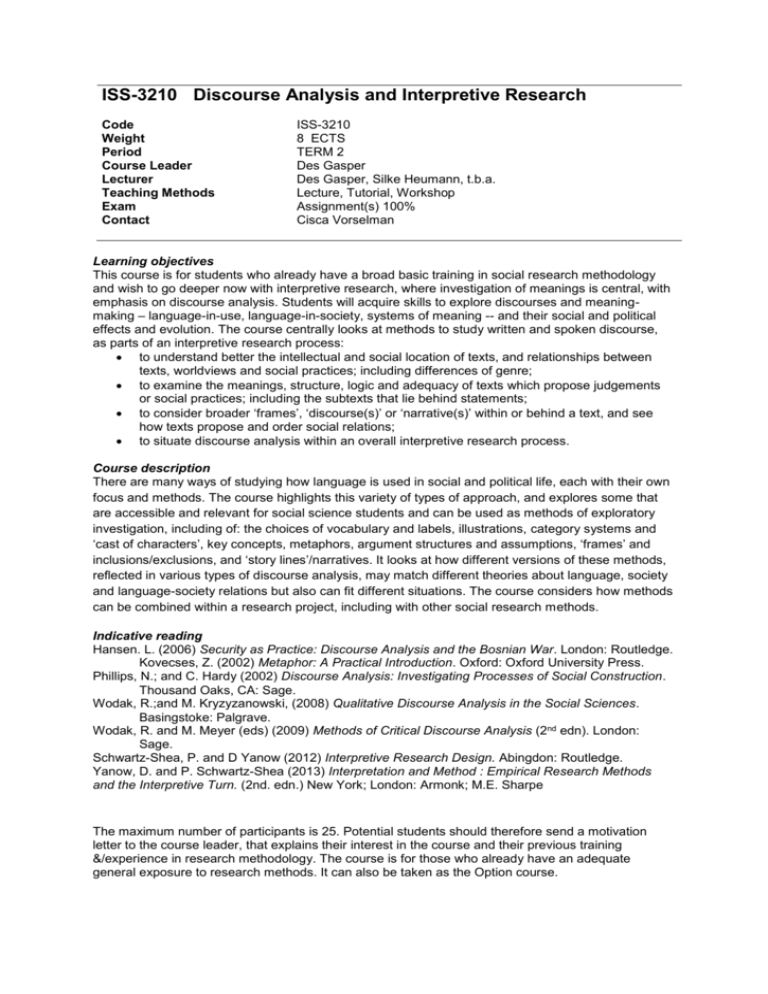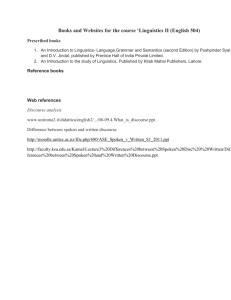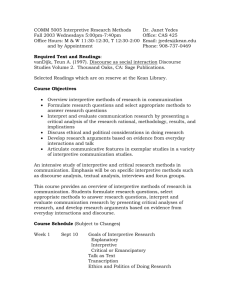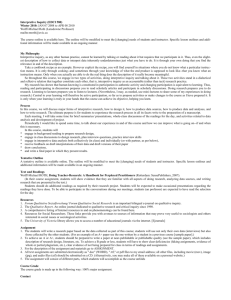ISS-3210 Discourse Analysis and Interpretive Research
advertisement

ISS-3210 Discourse Analysis and Interpretive Research Code Weight Period Course Leader Lecturer Teaching Methods Exam Contact ISS-3210 8 ECTS TERM 2 Des Gasper Des Gasper, Silke Heumann, t.b.a. Lecture, Tutorial, Workshop Assignment(s) 100% Cisca Vorselman Learning objectives This course is for students who already have a broad basic training in social research methodology and wish to go deeper now with interpretive research, where investigation of meanings is central, with emphasis on discourse analysis. Students will acquire skills to explore discourses and meaningmaking – language-in-use, language-in-society, systems of meaning -- and their social and political effects and evolution. The course centrally looks at methods to study written and spoken discourse, as parts of an interpretive research process: to understand better the intellectual and social location of texts, and relationships between texts, worldviews and social practices; including differences of genre; to examine the meanings, structure, logic and adequacy of texts which propose judgements or social practices; including the subtexts that lie behind statements; to consider broader ‘frames’, ‘discourse(s)’ or ‘narrative(s)’ within or behind a text, and see how texts propose and order social relations; to situate discourse analysis within an overall interpretive research process. Course description There are many ways of studying how language is used in social and political life, each with their own focus and methods. The course highlights this variety of types of approach, and explores some that are accessible and relevant for social science students and can be used as methods of exploratory investigation, including of: the choices of vocabulary and labels, illustrations, category systems and ‘cast of characters’, key concepts, metaphors, argument structures and assumptions, ‘frames’ and inclusions/exclusions, and ‘story lines’/narratives. It looks at how different versions of these methods, reflected in various types of discourse analysis, may match different theories about language, society and language-society relations but also can fit different situations. The course considers how methods can be combined within a research project, including with other social research methods. Indicative reading Hansen. L. (2006) Security as Practice: Discourse Analysis and the Bosnian War. London: Routledge. Kovecses, Z. (2002) Metaphor: A Practical Introduction. Oxford: Oxford University Press. Phillips, N.; and C. Hardy (2002) Discourse Analysis: Investigating Processes of Social Construction. Thousand Oaks, CA: Sage. Wodak, R.;and M. Kryzyzanowski, (2008) Qualitative Discourse Analysis in the Social Sciences. Basingstoke: Palgrave. Wodak, R. and M. Meyer (eds) (2009) Methods of Critical Discourse Analysis (2nd edn). London: Sage. Schwartz-Shea, P. and D Yanow (2012) Interpretive Research Design. Abingdon: Routledge. Yanow, D. and P. Schwartz-Shea (2013) Interpretation and Method : Empirical Research Methods and the Interpretive Turn. (2nd. edn.) New York; London: Armonk; M.E. Sharpe The maximum number of participants is 25. Potential students should therefore send a motivation letter to the course leader, that explains their interest in the course and their previous training &/experience in research methodology. The course is for those who already have an adequate general exposure to research methods. It can also be taken as the Option course.








